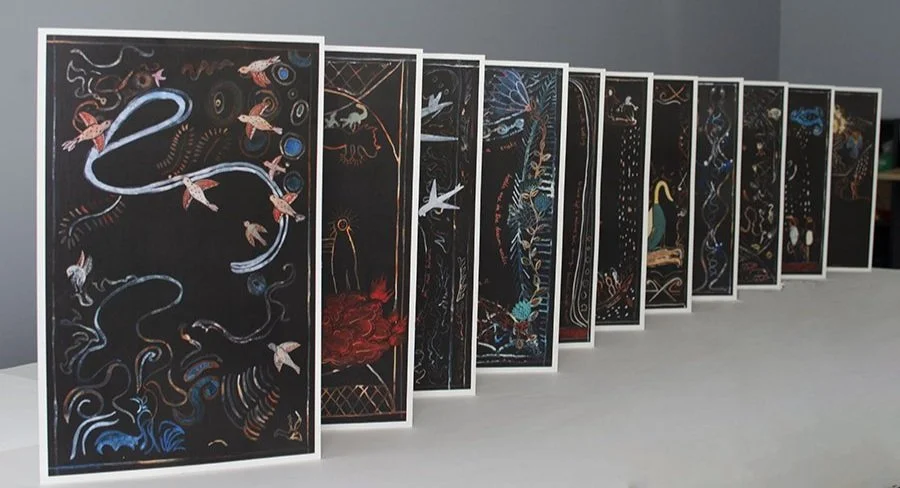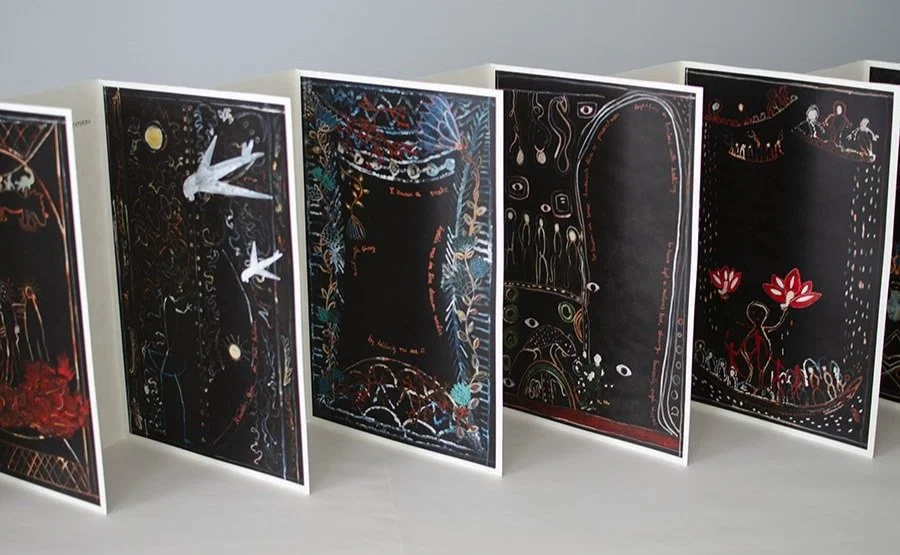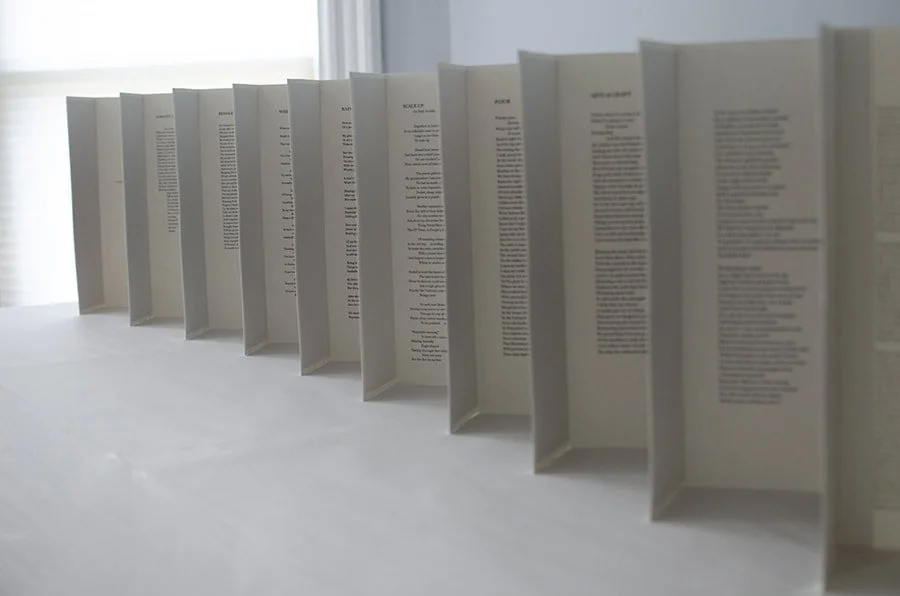Redolent
Redolent
2022
Images by Nancy Friedemann-Sánchez, poems by Farid Matuk
Handmade, limited-edition artist book
Singing Saw Press
Redolent is a handmade, limited-edition artist book comprising twelve prints of paintings by Nancy Friedemann-Sánchez and seven poems by Farid Matuk, designed and produced by Singing Saw Press.
The result of a yearslong collaboration, Redolent draws on resonances across Friedemann-Sánchez’s and Matuk’s independent practices, in which each address the ever-developing legacy of colonization in the Americas, including through personal experiences of migration, Friedemann-Sánchez from Colombia and Matuk from Peru. The poems and images in Redolent build a vocabulary of beauty and violence, where lush flora and fauna are entangled with symbols of surveillance and militarization and where tender expressions of kinship brush against relations of patriarchy and nationhood. Having worked, as Matuk writes, “at the double edge of body and breath...trading image and word until their borders became creases in a folding whole,” the poems and image echo directly at times, while at others, they glean from one another as they move toward their own interests.
Joyelle McSweeney on Farid Matuk and Nancy Friedemann-Sánchez
Black, rich, and resinous, the folding world of Farid Matuk and Nancy Friedemann-Sánchez's Redolent (Singing Saw Press) signals at a glance that we must shed our earthly lungs to breathe this mysterious element. In this dark stratum, all icons circulate and show themselves to have secret sides—even birds and flowers, even the human hand and the human eye, which do not bother to hide their doubleness. Matuk's lyrics trace an ill, ecstatic fuse, now intimate, now cosmic, now hushed, now explosive, melting history, nation, and time down to a black fluid across which ancestors may cross. But will they ever arrive? The future is as close as the daughter's face, as distant as a mother's unimaginable youth. Friedemann-Sánchez's panels ground and propel, anticipate and echo the convulsive intimacy of Matuk's verse. Her pictoriality seems at once quotational, testimonial, visionary, and speculative, and is layered with material as alien as Tyvek, as close-to-hand as the botanically-derived barniz de Pasto technique that yields this refulgent black. Most importantly, the poet's and the artist's hands protect and disclose each other's visions with immediacy and responsiveness. Against the omni-extractiveness that defines our current moment and seeks to rattle our futures as it has our pasts, Redolent entails a singular rejoinder: collaboratively constituted, inextricable, and radiant with refusal.
The images in Redolent are one expression of Friedemann-Sánchez’s ongoing research into the precolumbian artisanal practice of Barníz de Pasto (Mopa Mopa), a technique from Putumayo and Nariño regions of Colómbia, designated in 2020 as a UNESCO Intangible Cultural Heritage in Need of Urgent Safeguarding. An indigenous lacquering technique using the resin from the local mopa-mopa tree, Barníz de Pasto objects became prized by Spanish colonists in the 17th and 18th century, as an approximation of lacquered boxes from China and Japan. Friedemann-Sánchez mimics this work using contemporary materials. By doing this, she writes, “I get to the core of something within the past that speaks to our present. The imposition of one culture on another operates as a form of collage itself. It is not my intention to be an ethnographer, but by observing art as an artist I can depict the visual history of domination, subordination, and cultural erasure of one population upon another and their resulting resistance to those actions.”
The poems in Redolent explore aspects of Matuk’s biography—he was preemptively kidnapped by his mother from Peru and taken to the United States as his mother fled both an abusive an relationship and a patriarchal state whose police fail to recognize women and femme bodies as subjects. A queer writer of mixed Syrian and Peruvian heritage who has lived in the U.S. variously as an undocumented person, a “legal” resident, and finally as a “naturalized” citizen, Matuk’s engagement with Friedemann-Sánchez’s images extends his practice at “the double edge of body and breath,” as Alice Notley named the possibility of language’s entanglement with near and far, present and past, self and other, while remaining firmly grounded in one’s accountable position in structures of power. Matuk writes, “Decidedly decolonial and feminist, dedicated to what can be, Nancy’s works nonetheless guide me to begin with what some of us have been and still are. The materials need not be our friends; they’re free to intend our plunder back into us by the ply, and if there’s relief, it comes from not standing apart.”
Specs
Accordion book of 12 large and 11 small leafs
9x14 inches; expands to approximately eight feet
Constructed on 70lb French paper
Images digitally printed in full-color on 80lb Mohawk paper
Text letterpress printed from photopolymer plates
Edition of 60




